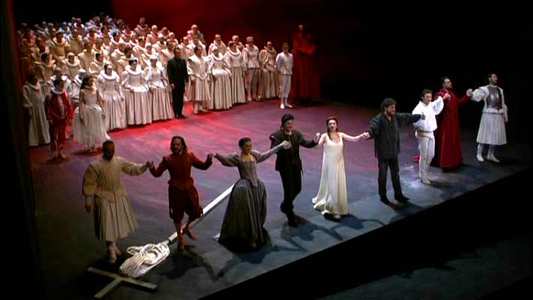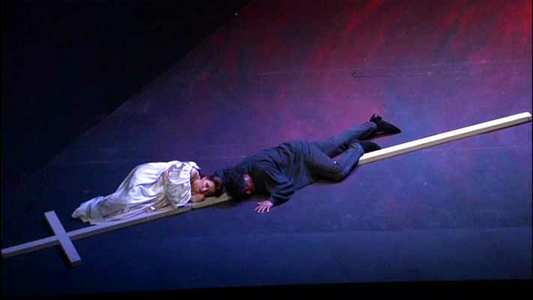Verdi: Otello (Ros-Marbà)
Introduction
A live performance from Barcelona, filmed over two nights in February 2006.
Being one of Verdi`s forays into Shakesperian drama, the plot is a cut-down, but highly focussed version of the original, concentrating on the goings-on between the evil schemer, Jago (I`ll stick with the Italian spellings), and his despised boss, Otello. An ex-Muslim mercenary, who has converted to Christianity to fit in better with Venetian society, Otello is now `protecting` Venice by battling the Islamic armies himself, but is easily tricked into believing his wife, Desdemona, is having an affair with his ex-captain, Cassio. This of course leads to a huge amount of jealousy, brow-beating, and the inevitable tragic ending.

Video
Video (NTSC) quality is generally very good, although there are some darker scenes which appeared to create a `blotchy throbbing` in the blackness. This is another Opus-Arte disc which was filmed using HD cameras, but I`m afraid I`m not able to enjoy the full effect of this, being without the necessary hardware.

Audio
The DTS sound is rather better than the other productions I have seen from this venue. There is absolutely no problem with balance, and extremes of volume are excellently handled. If there was some microphone fiddling for some of the quieter moments, when solo intruments come to the fore, then it has been done quite tastefully.

Features
The main extra is a rather paltry 5 minute `introduction` which could easily have been stretched out into a more substantial documentary. There are some interesting religious aspects to this work which have some contemporary resonances, and we only touch upon these before the introduciton is over.
A fairly straightforward and unpretentious short essay comes in the accompanying booklet, and the usual plethora of subtitle choices can be chosen should you feel the urge to learn the libretto in 5 other languages other than your own.

Conclusion
I`ve always had a slight problem with `Otello`, mainly stemming from the fact that the plot, as it is in the opera at least, seems far too sparse to be stretched out over a four-acter. Luckily, the 70-plus year old Verdi had a few tricks up his sleeve, not the least of which was to forego the more familiar setup of arias, scenes and whatnot, but to through-compose the music, allowing the drama to flow as naturally as it can. There are still a few `longeurs` (the Willow Song for one(Blashemy)!, which seems to hold things up a treat - probably why Zeffirelli didn`t include it in his film), but other than that, everything moves along at a nice pace,a nd the musical invention is stunning, with strong echoes of Wagner, and pre-empting Puccini in some of the `lusher` passages.
This is helped by some lively conducting fromAntoni Ros-Marbà, and generally very fine playing from the orchestra. A few moments of scrappyness stand out unfortunately, such as the connection between the difficult solo woodwind runs towards the beginning, and the cor anglais sounding slightly out of breath around the Willow Song.
Willy Decker`s design is quite claustrophobic and austere, squeezing the action (and all the singers) onto an enclosed, sloping stage that contains very little apart from an ever-present large wooden cross. I imagine the staging focussed the music rather well in the theatre itself. Either that, or created one big noise from beginning to end. It didn`t have any detrimental effect on the DVD sound at all though. The use of a large mirror was a nice touch, although the reflection of the orchestra doing its stuff in the pit was slightly distracting. We also have some more of the wobbly camerawork I`m so used to from this theatre, but it wasn`t as noticeable as usual, so either I`m becoming immune, or they nailed them down this time.
The quality of the singing is variable, although never too horrible. José Cura (Otello) and Krassimira Stoyanova (Desdemona) both have their good and less than good moments, sometimes wavering painfully around a note before settling on it a bit too late, but then coming out with some wonderfully performed passages. Perhaps this is something to do with being filmed on more than one night, but we shall never know. Overall though, Cura seems to come into his own as the opera progresses, and we can well believe he has lost his mind by the time he murders his wife.
Lado Ataneli (Jago) is much more secure from the off, and creates a charmingly evil character who is able to seduce anyone into his irreligious world with a few words and subtle expressions. Musically, is is every bit the equal of Cura, which results in a highly charged duet at the end of Act 2.
The chorus does a great job, in what is one of the more difficult operas for them. There are one or two moments where they are well behind the beat (also an issue with a couple of the soloists at times) but that`s a live performance for you.
This is certainly one to try, although there are more persuasive accounts around.
Your Opinions and Comments
Be the first to post a comment!